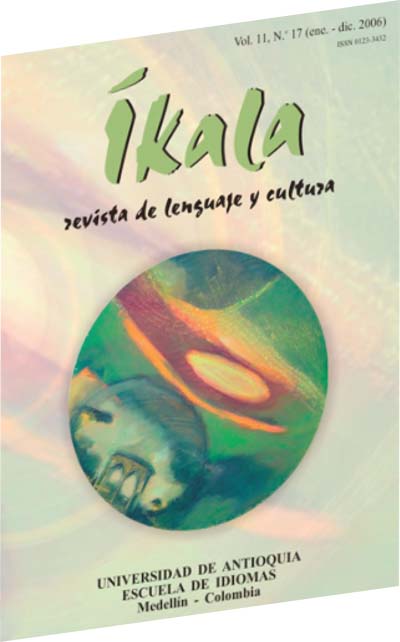*Washback of the ICFES Exam: A Case Study of Two Schools in the Departamento del Atlántico*
DOI :
https://doi.org/10.17533/udea.ikala.2787Mots-clés :
examen ICFES, effet de reflux, enseignement de l'anglaisRésumé
Cette étude décrit l'impact qu'ont eu les examens d'état de connaissance du niveau secondaire (examens ICFES) dans l'enseignement de l'anglais en Colombie depuis leurs modifications en 2000. Nous avons de façon concrète décrit et discuté l'effet de reflux (effet washback) de l'épreuve d'Anglais dans deux collèges publics et nous avons présenté les résultats obtenus grâce à la triangulation des données et des sources de l'information.
Reçu: 28-03-06 / Accepté: 31-07-06
Comment citer cet article:
Barletta, N & May, O. (2006). Washback of the ICFES Exam: A Case Study of Two Schools in the Departamento del Atlántico. Íkala. 11(1), pp. 235 – 261
Téléchargements
Références
Alderson, J. C., 1992, “Guidelines for the evaluation of language education”. In J. C. Alderson & A. Beretta (Eds.), Evaluating second language education (pp.274-304). Cambridge, England: Cambridge University Press.
Alderson, J. C., & D. Wall, 1993, “Does washback exist?”, Applied Linguistics, 14 (115-129).
Andrews, S. et al., 2002, “Targeting washback – a case study”, System, 30 (207-223).
Bachman, L. F., 1990, Fundamental considerations in language testing. Oxford: Oxford University Press.
Bachman, L. F., & A.S. Palmer, 1996, Language testing in practice. Oxford: Oxford University Press.
Bailey, D. M., 1996, “Working for washback: A review of the washback concept in language testing”, Language Testing, 13(257-279).
Biggs, J., 1995, “Assumptions underlying new approaches to educational assessment”. Curriculum Forum, 4(2), 1-22
Biggs, J., 1996, Testing: To educate or to select? Education in Hong Kong at the cross-roads. Hong Kong: Hong Kong Educational Publishing.
Canale, M. & M, Swain, 1980, “Theoretical bases to communicative approaches to communicative teaching and testing”, Applied Linguistics, 1 (1-47).
Chapman, D., & C, Snynder, 2000, “Can high stakes national testing improve instruction: Reexamining conventional wisdom”, International Journal of Educational Development, 20, 457-474.
Chen, L., 2002, Washback of a public exam on English teaching. (ERIC Document Reproduction Service No. ED472167)
Chen, L., 2000, Washback or backwash: A review of the impact of testing on teaching and learning. (ERIC Opinion papers ED 442280)
Chen, L., 2003, “Looking at the impact of a public examination change on secondary classroom teaching: A Hong Kong case study”, Journal of Classroom Interaction, 38 (1), 1-10). 257 Íkala, revista de lenguaje y cultura Vol. 11, N.º 17 (ene.-dic., 2006)
Cheng, L., & A. Curtis, 2004, “Washback or backwash: A review of the impact of testing on teaching and learning”. In L. Cheng, Y. Watanabe & A. Curtis (Eds.), Washback in language testing: Research contexts and methods. Mahwah, N.J.: Lawrence Erlbaum.
Cheng, L., et al (eds.), 2004, Washback in language testing: Research contexts and methods. Mahwah, N.J.: London: Lawrence Erlbaum.
Hughes, A., 1993, Backwash and TOEFL 2000, Unpublished manuscript, University of Reading in England.
___, 2003, Testing for language teachers (2nd Ed.) Cambridge: Cambridge University Press. Instituto Colombiano para el Fomento de la Educación Superior. (n.d). Nuevo examen de estado para el ingreso a la educación superior: Cambios para el siglo XXI- Idiomas. [Retrieved November 1, 2004].
Madaus, G., 1990, Testing as a social technology. Paper presented at the inaugural annual Boisi Lecture in Education and Public Policy, Boston College.
Messick, S.,1996, “Validity and washback in language testing”, Language Testing, 13 (3), 241-256. Merril, S., 1998, Qualitative research and case study applications in education (2nd Ed.) San Francisco: Jossey_Bass.
Pearson, G., 1988, “Tests as levers for change”. In: D. Chamberlain & R. J. Baumgardner (eds.) ESP in the classroom practice and evaluation. Modern English Publications.
Petrie, H. G., 1987. “Introduction to evaluation and testing”, Educational Policy, 1, 175-180.
Quesada, R., 2001, Washback overrides the curriculum: An exploratory study on the washback effect on a high-stakes standardized test in the Costa Rican EFL high school context [Abstract]. DAI, 62, 05a, 1814. S
aif, S., 2000, Theoretical and empirical considerations in investigating washback: A study of ESL/EFL learners [Abstract]. DAI, 61, 03, 966. Shohamy,
E., S. Donitsa-Schmidt, and I. Ferman, (1996). “Test impact revisited: Washback effect over time”, Language Testing, 13, 3, 298-317.
Wall, D., 1996, “Introducing new tests into traditional systems: insights from general education and from innovation theory”, Language Testing, 13 (3) 334-354.
Wall, D., 1997, “Impact and washback in language testing”, in: C. Clapham & D. Corson (Eds.), Encyclopedia of language and education: Vol. 7. Language testing and assessment (pp. 291-302), Dordrecht: Kluwer Academic.
Watanabe, Y., 2004, “Methodology in washback studies”, in: Cheng, L., Y. Watanabe & A. Curtis (Eds.), Washback in language testing: Research contexts and methods. (pp.19-36). Mahwah, N.J.: Lawrence Erlbaum.
Téléchargements
Publié-e
Comment citer
Numéro
Rubrique
Licence
(c) Tous droits réservés Íkala, Revista de Lenguaje y Cultura 2006

Cette œuvre est sous licence Creative Commons Attribution - Pas d'Utilisation Commerciale - Partage dans les Mêmes Conditions 4.0 International.












